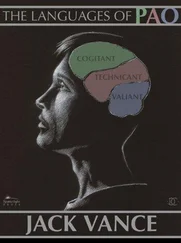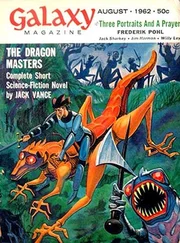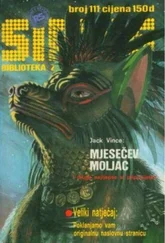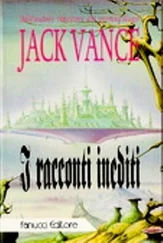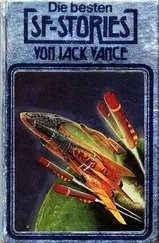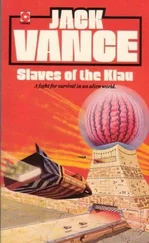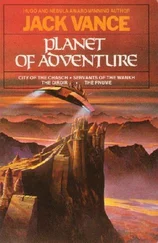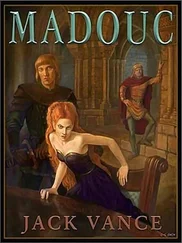Here was the girl who, nearly naked, waited to serve him when he left his bath.
He leaned forward. Or was she? She regarded him with impersonal interest, frowning slightly as if puzzled by his interest. Glystra mumbled, “Charmed to make your aquaintance,” and she moved away.
Watching the swing of her body in its complicated wrappings of silk and toile and net, Glystra was certain that she was the same girl.
Bishop nudged him. “There’s something rather peculiar—”
“What?”
“Our host Sir Clarence—I’ve seen him before.”
“So have I.”
“Where? Do you remember?”
“At the Hunt Club?”
Bishop snapped his fingers. “That’s it.”
“Who is he?”
“Sir Clarence is—or was—the doorman at the Hunt Club.”
Glystra stared, first at Bishop, then at Sir Clarence, who now was speaking with Nancy.
Bishop was right.
Behind him he heard a booming laugh, a great roar of merriment. “Haw, haw, haw! Look at that!”
It was Corbus’ laugh, and Corbus laughed only rarely.
Glystra whirled. He looked face to face with Cloyville.
Cloyville wore a black livery, with tiny gold epaulettes. He pushed a cart laden with canapes.
Glystra broke into laughter, as did Bishop and Pianza. Cloyville blushed, a tide of red rising up his bull neck, over his cheeks. He darted an appealing glance toward Sir Clarence, who watched him impassively.
“Well, Cloyville,” said Glystra, “suppose you let us in on it… Picking up a little spare change during your stay?”
“Care for hors d’oeuvres, sir?” asked Cloyville tonelessly.
“No, damn it. No hors d’oeuvres. Just an explanation.”
“Thank you, sir,” said Cloyville and rolled his cart away.
Glystra turned to Sir Clarence. “What’s going on? What’s the joke?”
Sir Clarence wore a puzzled look. “The man is new to my employ. He came to me well recommended—”
Glystra wheeled, strode after Cloyville, who seemed intent on rolling his cart out of the room.
“Cloyville!” barked Glystra. “We’re going to thrash this thing out right here.”
“Quiet!” hissed Cloyville. “It’s not polite to create such a disturbance.”
“Thank God I’m not an aristocrat then.”
“But I am—and you’re hurting my prestige!”
Glystra blinked. “You? An aristocrat? You’re just a flunky pushing around a tray of sandwiches.”
“Everybody’s the same way,” said Cloyville dispiritedly. “Everybody works. Everybody is everybody else’s servant. How do you suppose they keep up the front?”
Glystra sat down. “But—”
Cloyville said savagely, “I decided I liked it here. I want to stay. I’ve had enough of tramping across forty thousand miles of jungle, getting killed. I asked Sir Walden if I could stay. He said yes, but he told me I’d have to work like everybody else, and work hard. There’s not a more industrious people in space than the Kirsters. They know what they want, they work for it. For every hour of swanking around as an aristocrat they put in two working—in the shops, the factories, in the homes. Usually all three. Instead of living one life, they live two or three. They love it, thrive on it. I like it too. I’ve decided I’m built the same way. Call me a snob,” he shouted, voice rising angrily. “I admit it. But while you and the others are rotting your bones out in the muck I’ll be living here like a king!”
“That’s all right, Cloyville,” said Glystra mildly. “Or perhaps I should say, Sir Cloyville. Why couldn’t you tell me of your plans?”
Cloyville turned away. “I thought you’d try to argue with me. Or talk about duty, rot like that—”
“Not at all,” said Glystra. “You’re a free agent.” He turned away. “I wish you luck. I hope you’ll like it here. If we ever get to the Enclave I’ll send a plane back to pick you up” He returned to the main hall.
Early the next morning a carriage called at the castle of Sir Walden Marchion. Scrutinizing the men who pulled the carriage, Glystra recognized one of Sir Clarence’s sons.
Wailie and Motta were missing. Glystra asked Bishop, “Where’s your girl friend?”
Bishop shook his head. “She had breakfast with me.”
“Did she know we were leaving?”
“Well—yes.”
Glystra turned to Corbus. “How about Motta?”
Corbus looked at Bishop. “Let’s face it.” He grinned. “We’re just not the men these Kirsters are…”
Glystra could not prevent himself from glancing swiftly toward Nancy. There she was, pale, rather taut—but there she was. He smiled at her, uncertainly. There was still distance between them.
He turned back to Corbus and Bishop. “Do you want to look for them?”
Corbus shook his head. “They’re better off here.”
“Let’s go,” said Bishop.
At the monoline station, the head porter reached into the carriage, unloaded the packs, to a cart, wheeled them to the trolleys.
Glystra winked at his fellows. The porter was Sir Walden Marchion.
With a straight face Glystra tipped him once again, three small iron washers.
Sir Walden bowed low. “Thank you very much, sir.”
Kirstendale dwindled in the west. As before Clodleberg rode in the lead, with Glystra following. Then came the first freight carrier with Corbus and Nancy, then the second with Bishop and Pianza. Cloyville’s trolley had been left behind at Kirstendale.
The party was dwindling. Glystra thought back across the last few weeks. A desperate bloody time. Ketch, Darrot, Vallusser—killed. Cloyville had abandoned the trek. Abbigens, Morwatz, the fifty Beaujolain soldiers— all killed. Heinzelman, the Politburos, the Magickers in the griamobot—killed. A trail of death speading behind like a wake… Who would be next?
The thought hung in his mind like a cloud, while they sailed along the bank of a quiet river—the East Fork of the Thelma. The countryside was clumped with Earth-type oaks, cypress, elm and hemlock, imported with the first settlers and now well-adapted; Big Planet flora: bell-briar, mutus weed, handkerchief trees, with flowers like strips of rag, bronzenbush, wire-aspen, a hundred nameless varieties of low jointed furze. Truck-farms and paddies occupied the river meadows; the caravan passed neat rows of thistle and legumes, tended by a moon-faced thick-necked people who paid them no heed whatever.
The river presently bore to the north. The monoline continued east, and the country changed. The green meadows and forest became a dark blur to the left and behind; ahead was dry savannah and a range of blue hills in the far Big Planet distance. Clodleberg pointed. “The Eyrie.”
At noon on the third day Clodleberg pointed ahead once more. “We’re coming to Lake Pellitante.” Glystra saw the sheen of water, a limpidity in the sky that told of reflection from a large sheet of calm warm water.
The ground became marshy, and presently the mono-line swung to the south. For half an hour they crossed dunes sparsely overgrown with dry yellow grass, and the glare off the white sands combined with the normal brilliance of the sunlight made ordinary vision painful.
A high dune passed below, the dry grass licking up at the trolleys like spume at the crest of a wave, and they coasted down toward a lagoon choked with brilliant yellow reeds.
Clodleberg, riding fifty yards ahead, suddenly dropped from sight. The yellow reeds boiled with life; naked men, thin and tall as giraffes, painted in vertical yellow and black stripes, sprang forth. They were immensely tall— eight feet or more—and they came in great bounds. A sharp cry like a bugle-call sounded; the men stopped short, stiffened back to heave spears… Violet light fanned out, crackling with white sparks. The tall men fell like rags. Three had not been killed, but lay thrashing their long arms and legs like upturned insects.
Читать дальше


